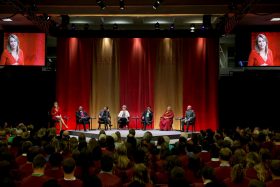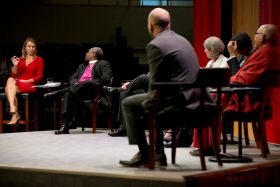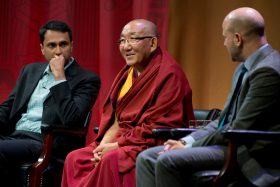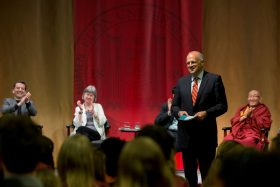In an event moderated by Lara Logan of "60 Minutes," six spiritual leaders urged Elon students to intentionally interact with people of various faith traditions.

Moderated by “60 Minutes” correspondent Lara Logan, the program, “Sacred Space: The Promise for Peace and Understanding in Our World – A Multi-faith Conversation,” took place following the university’s formal dedication of the Numen Lumen Pavilion, a multi-faith center in the Academic Village that serves as home to the Truitt Center for Religious and Spiritual Life, as well as the Center for the Study of Religion, Culture and Society.
A short video introduction featuring four current Elon University students and Edna Truitt Noiles ’44, who made a gift with her husband, Doug, to create the Truitt Center in 2001, opened the ceremony.
The program was filmed by UNC-TV for broadcast at a future date.

“The world is a much smaller place and the differences between people are magnified in some respects because of that,” Logan said as she opened the program. “For people who don’t get to travel the world, this is where you can do it. When you’re a student you haven’t become crusty and cynical and entrenched in your positions.”
Panelists largely agreed that one of the worst aspects to interacting with small numbers of followers of different faith backgrounds is when those people act as if their religion is the only true answer and treat others through “overtures of domination.”
“I really don’t like if somebody says their way is the only way. If they say it that way, I don’t like it. I’m a Buddhist and will never say my way is the only way,” said Arjia Rinpoche, the former abbot of Kumbum Monastery, one of the six great centers of Buddhism in Tibet, now living in exile in the United States as a devoted scholar and teacher. “Everybody has their concerns. I know and I understand. But the only way is their way? If somebody says that, they don’t truly understand their own religion.”
Adherents can also be detrimental to those who share their faith, especially among young people. Sharon M.K. Kugler, a Roman Catholic and the university chaplain at Yale University, said she sees it sometimes in her role at Yale.

Guests shared views on interfaith understanding in the United States and what they see in the near future as religious pluralism continues to expand even as the number of Americans who described themselves as having “no religion” approaches one out of every five people.
“As we become more religiously diverse, we’re also become a less religious America than we ever have been,” said Greg Epstein, a New York Times bestselling author and the humanist chaplain at Harvard University. His broader point is that using religion or faith as an umbrella for rallying a nation leaves out those who don’t possess a particular faith. “What are we going to do about that? … If that’s all we’re bringing together (based on faith) and are willing to leave out 18 percent of the people in symbolic events, that’s going to come back to bite us.”
The Rev. Michael Curry, bishop of North Carolina’s Episcopal Church, said that another problem in the United States today is the hardening of beliefs not necessarily tied to a belief system. “I do think there is a segmenting, a fragmenting, a segregation of our culture,” he said. “I don’t know it’s religious in a formal sense. It’s a religion in another sense. A deeply held conviction is religion.
“Republicans don’t marry Democrats anymore. Think about it. Liberals marry liberals. Conservative marry conservative,” Curry added. “We must create world where folks from Fox News and MSNBC get married!”
Places of higher learning such as Elon University can grow the next generation of leaders with an understanding of the need to promote multi-faith dialogue.
“There ought to be a set of people who call themselves ‘interfaith leaders,’” said Eboo Patel, an American Muslim of Indian heritage who is an author, journalist and founder and president of the Interfaith Youth Core. “There is no place on the planet that I know of where an idea can go to reality faster than on a college campus.
“The work that I’m dedicated to and the work that my organization is doing in partnership with Elon University, especially on a day like this, is how do you create spaces in which people’s commonalities are so beautiful and so salient that they look at each other and say it’s obvious that we’re going to be friends.”
Rabbi David Wolpe, of Sinai Temple in Los Angeles and named among the most influential rabbi in America by Newsweek magazine, advised students to intentionally interact with individuals of different faiths, and not just to tolerate, but to get to know others as people.
“If you see this as an opportunity to open yourself to the possibility not just of tolerating other faiths, but learning from other faiths, than you’re far ahead of the previous generation,” he said. “What I want to suggest to you is that you actually have the courage to go outside of yourself, to encounter, to speak with people, to know people.”

Elon University President Leo M. Lambert recognized the various groups as he thanked Logan and the panelists for their reflections and knowledge shared during Convocation.
“How lucky we are to have Lara Logan as our moderator today,” Lambert said. “And what a privilege to have such distinguished panelists with us, a once in a lifetime opportunity. Thank you for sharing your insights and your humanity and your love with us.”


